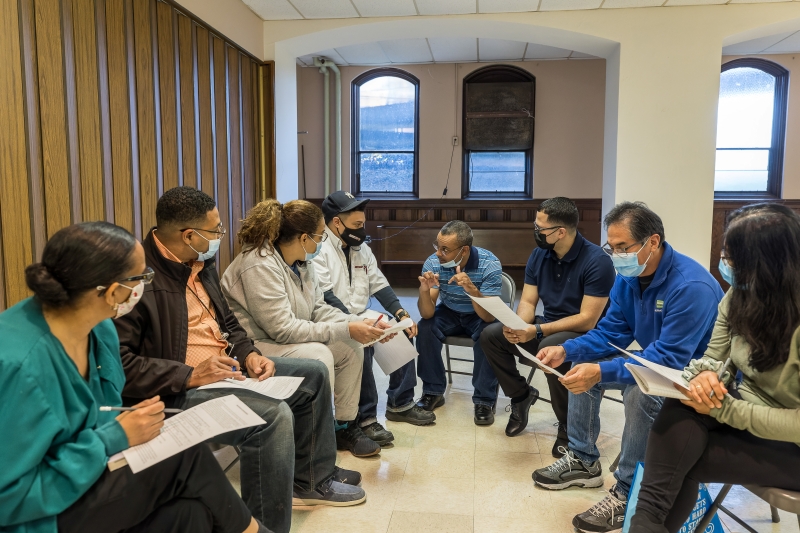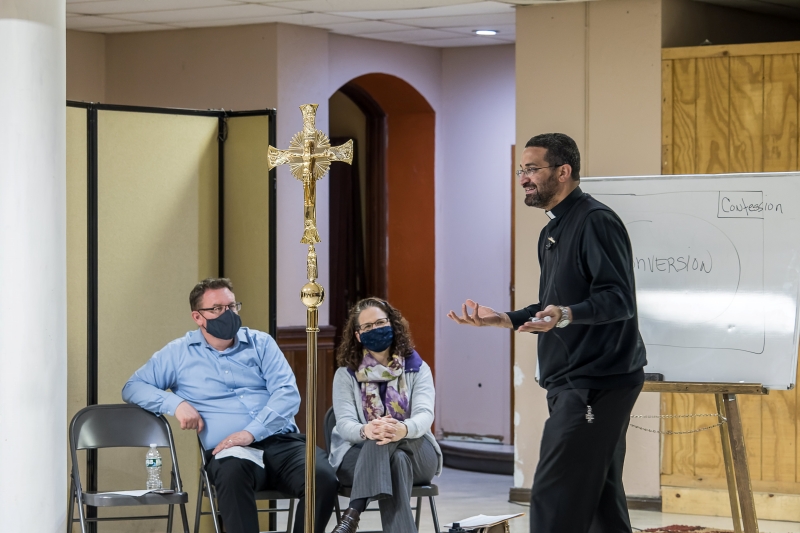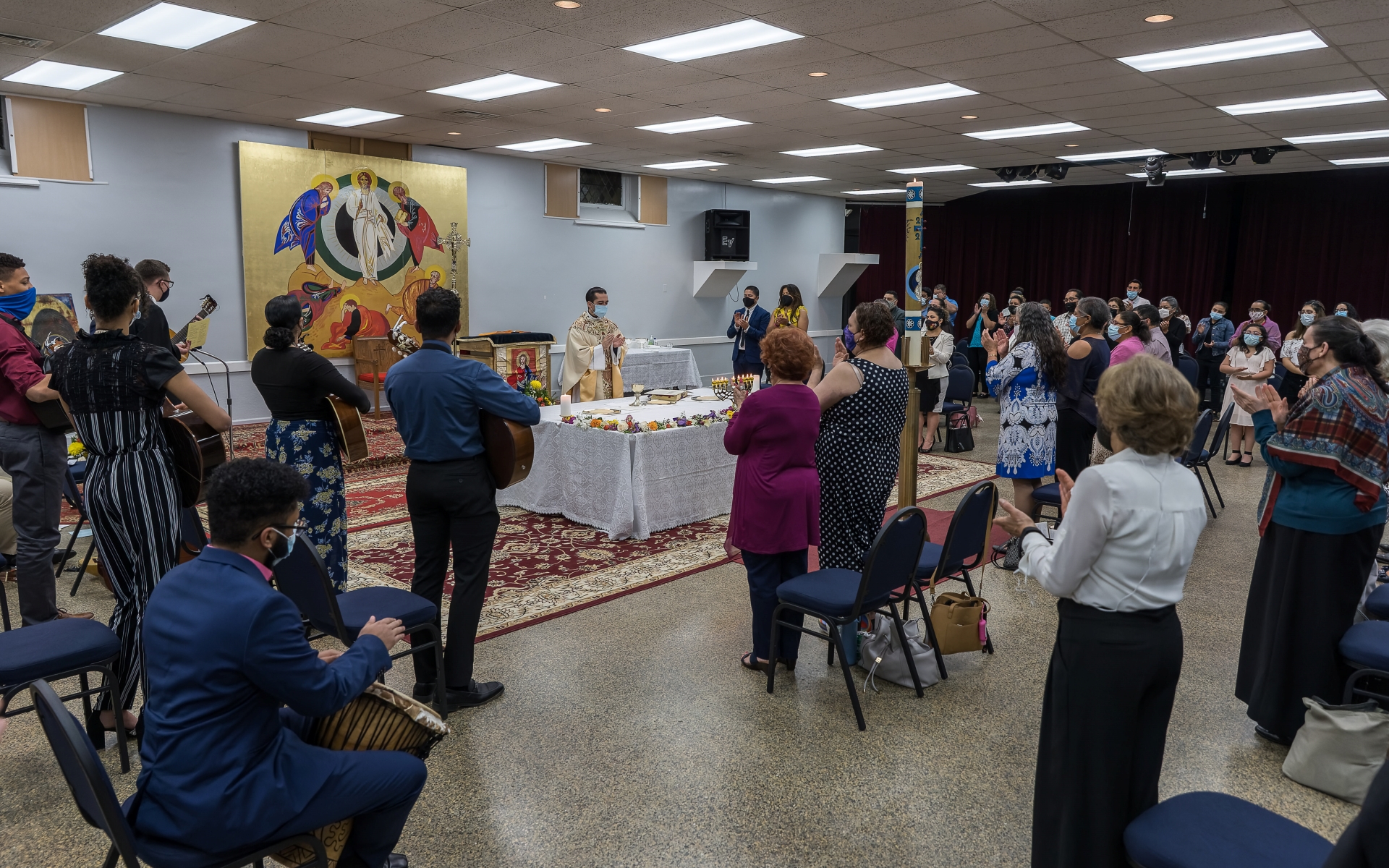
Parishioners in the parish hall at St. Lawrence O’Toole Church, part of Maria Reina de la Paz Parish in Hartford, participate in animated small group discussions during a Neocatechumenal Way catechesis session. Photo by Aaron Joseph

Father Justino Cornejo along with David and Michelle Rak are part of a Neocatechumenal Way Itinerant Missionary Team that assists in re-evangelizing the faith in the Archdiocese of Hartford. Photo by Aaron Joseph
Story by Shelley Wolf
NEW BRITAIN – Based out of St. Ann Church, part of St. Joachim Parish in New Britain, a small team of traveling missionaries are helping Archbishop Leonard P. Blair re-evangelize the faith in the Archdiocese of Hartford.
“We are house guests. We live by Divine Providence and go wherever the Lord sends us,” says David Rak, one of the team members who works with his wife, Michelle, and their five children as family missionaries.
The Raks are joined by Father Justino Cornejo, from the Diocese of Newark, N.J., who serves as the Neocatechumenal Way liaison to the Archdiocese of Hartford. Other team members include Jan Zarzecki, a seminarian for the Archdiocese of Hartford; David Narvaez, a seminarian for the Archdiocese of Washington, D.C.; and Oscar Heredia, a missionary from California.
Together they make up the Neocatechumenal Way Itinerant Missionary Team.
In 2015, Archbishop Leonard P. Blair invited the team into the archdiocese to offer religious instruction and to form small faith communities within parishes, wherever pastors choose to invite them in.
“The pastors that use the Neocatechumenal Way, use it as part of their toolbox,” says Michelle Rak. “It’s a place to send people who want to grow in their faith.” Pastors typically invite all parishioners to participate, she adds, and sometimes direct individuals to it when they think the person will benefit.
Today in the Archdiocese of Hartford, there are Neocatechumenal Way communities at St. Joachim Parish in New Britain and Maria Reina de la Paz Parish in Hartford. Last spring, St. Therese Parish in Granby began offering catechesis in the Neocatechumenal Way in the hopes of founding a community there, too.
The Neocatechumenal Way, also known as The Way, began in the 1960s in Spain, where small Christian communities were developed among the poor. Today, adherents strive to form Catholics committed to the Word of God and to the Eucharist. They also possess a missionary spirit and seek to spread the Gospel locally and globally, in parishes and on the streets.
The Rak family encountered the Neocatechumenal Way for the first time at their own suburban church in Peoria, Illinois. They say they were trying to cope with a suburban life that involved two demanding careers and family life when their pastor connected them with the Neocatechumenal Way in their parish. By participating in catechesis sessions through The Way, they encountered lessons in the Scriptures and Catechism that totally changed their perspective on their lives.
“Nothing spoke so honestly and simply about God’s love in my life,” Michelle says.
She and David continued deepening their faith through The Way and grew their family. In time, they were asked to be family missionaries and accepted the mission assignment in Connecticut.
The Neocatechumenal Way is a spiritual charism and a way of forming people in the Catholic faith.
David describes it as “Christian initiation in the parish to bring people to an adult faith. It is totally for everyone,” he says. “It reaches those who are coming to church who need to be re-evangelized. Those on the peripheries are also reached because the church is missionary.”
As part of the team, David assists in delivering catechesis talks, which are typically offered twice a week for two months at a parish. The talks involve no official program or registration. Parishioners are simply invited to sit in to see if they like it.
“Come and see,” says Father Cornejo. “Every talk is an encounter.”
The talks, Father Cornejo says, are based on Scripture, the teachings in the Catechism of the Catholic Church, and the “kerygma,” a Greek word for the proclamation of the death and Resurrection of Jesus Christ by the Apostles as recorded in the New Testament.
“The Vatican II Council proposed that the Resurrection is to be lived in our lives,” Michelle explains. “Not just to be known, but to be experienced. This was something that transformed all of us. Because we’ve been in death and we’ve seen the Resurrection. This is what God wants to give you, to grow in this adult faith. Faith isn’t something just to be intellectually understood or to be practiced routinely. It’s actually something to be lived and to change your life.”
After about 20 to 25 people have completed the catechesis, they may choose to form a community within their parish.
Communities then meet for a Mass on Sunday night, called “Liturgy of the Eucharist,” in which many young people take an active part. They may also meet once a week for a mid-week evening gathering, called “Liturgy of the Word,” where participants sing, pray, and further explore the meaning of key words in Scripture and discuss how it applies to their lives.
“It’s a simple celebration where they prepare some readings, sing some songs, pray and reflect on how those readings are illuminating their life,” Michelle says. “They see how they are in a situation like Lazarus. Believe it or not, it’s very powerful, it’s very effective.”
The team asks participants to dig deep and think about how the lessons in the Bible speak to their modern-day struggles. Through this process of deep self-reflection, participants have epiphanies about their lives, begin to apply the lessons of Scripture and grow in numerous ways.
David says, “It’s about how the readings affect my life – concretely through the facts of my work life today, the situation of my marriage, the parenting of my children or if I’m a teenager. It’s about how this suffering and death is resurrected through Christ. Everything refers back to the Resurrection and the Good News.”
Critical questions get asked. Father Cornejo says, “We present an interpretation of Scripture that this is not something that just refers to the life of Abraham, Moses and Exodus or whatever happened. We say, ‘Your life is there. It’s timeless. This reading that is being proclaimed is speaking about your life. How does this resonate in your life?’”
Once you ask that question, Father Cornejo says, “You begin to see how people relate their lives with the Scriptures in very profound ways. And this begins to affect changes in their lives.”
David, the father of five, who moved his family to Connecticut to be family missionaries, agrees. “Lives are transformed in a real, tangible way,” he says.
Among the many benefits, participation has brought the fallen away back to Mass, deepened the faith of practicing Catholics, attracted youths, led to priestly vocations, strengthened troubled marriages and helped young people address substance abuse issues, according to the Raks, parish priests and participants.
Once friends and family members see the positive changes in a loved one, they often want to join the community.
“Relatives, coworkers and neighbors come,” Michelle says. “This is how the charism attracts. This is how it has evangelized all over the world.”

Neocatechumenal Way communities participate in a Mass celebrated on Saturday evening by Father Israel Rivera in the basement of St. Ann Church, part of St. Joachim Parish in New Britain. Photo by Aaron Joseph
